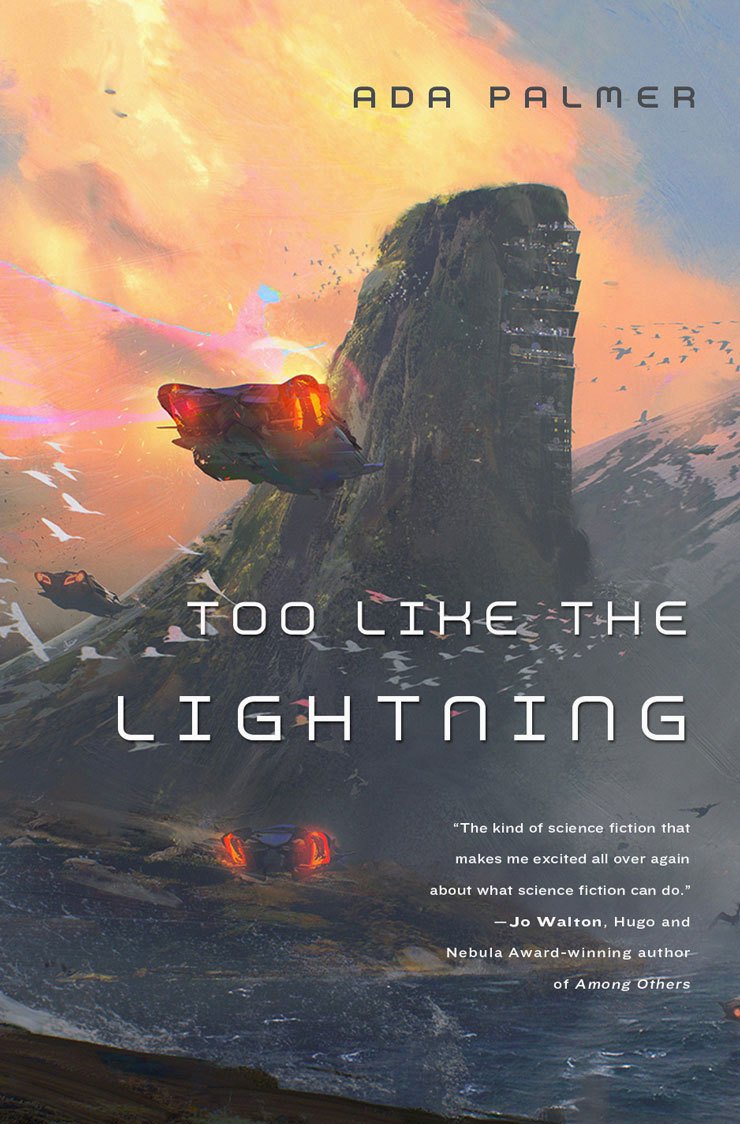Even though this isn't my first gender rodeo, Too Like the Lightning (and the rest of the Terra Ignota series) more than any other book broke my brain about gender a little. Ironically, this isn't necessarily even a series "about" gender; this is just an extra worldbuilding and characterization detail. I love it.
In world building Terra Ignota, I set out to imagine, not a future which no longer recognizes gender, but a future that pretends it doesn’t recognize gender, the long-term consequence of such a silence following a surface victory for gender, leaving old unconscious biases and systemic inequalities unaddressed.
This quote is from an incredible guest post by Ada Palmer that is well worth reading: web.archive.org/web/20211104030542/https://ninebookishlives.com/2021/11/02/book-tour-perhaps-the-stars-terra-ignota-4-by-ada-palmer-guest-post/. It's worth reading far more than the rest of my own post, so please go read it.
For me, it's hard to talk about Terra Ignota without also talking about Ancillary Justice and the Imperial Radch. In Radchaii culture, everybody gets an "ungendered" she as the pronoun they use. While reading the Ancillary books, I felt like I had to read "she" and then distance myself from my own cultural baggage of what "she" might mean while ALSO distancing myself from knowledge about physical gendered characteristics of some of the characters. The amount of work to keep it all straight^H^H^H^H^H^H^H^H queerly differentiated definitely indicated to me how many internal assumptions I need to keep eliminating.
This book was like that, but ten times worse. Let me bullet point out the various layers going on here:
- narrator deliberately and aggressively misgenders all other characters
- very little textual information about what gender characters identify themselves as
- narrator's gender choices are often done based on wild criteria
- narrator also drops in information (often belatedly) about character's bodies
- narrator is extremely unreliable, and also has been heavily edited
The worst part of it for me is that the narrator aggressively misgenders characters. This is an ostensibly "post-gender" world where people don't recognize gender, and Mycroft the narrator goes out of the way to use binary gendered pronouns for everybody. Especially with outside context, but even just in the text itself, I find this to be a deliberate choice, and it works to serve characterization and worldbuilding while also being deeply uncomfortable for the reader.
What's not fully clear is how much this misgendering bothers other people. Certainly, many characters find it extremely gauche, but textually it feels less like calling everybody the "wrong" gender, than just bringing up something that culturally should be unspoken. In one of the few chapters not narrated by Mycroft, Martin mentions editing Mycroft's language in previous chapters for "female MASONs" to restore the customary language. In another chapter, Thisbe is confused about Mycroft's choice of "he" for Dominic Seneschal. In both cases, it reads to me that Martin and Thisbe are making assumptions based on bodies here that they know the "real" underlying genders and are comfortable making those kinds of assumptions.
To say it differently, it is not as if the entire world of this book has suddenly decided to strongly identify as non-binary and so calling people by binary gendered pronouns is harmful; instead, it's a world where people mostly are trying to pretend that gender doesn't exist and are uncomfortable (like the reader!) when people bring it to the fore. That said, Sniper is the only character who I would put in a "non-binary" bucket, largely because we find out in a later book that it uses the pronoun it for itself. (There's also good reason for why it prefers this pronoun in how it wants to relate to the world.) That said, of course Mycroft also chooses misgendering here.
In terms of the reasoning that Mycroft uses to gender different characters, there's a wild set of reasons that are somewhat consistent even if unconventional. Here's a taste of this reasoning. Cousins exhibit female qualities, and therefore should be 'she'. However, Carlyle is a Cousin but is also a long-lost prince and therefore gets 'he'. Sniper is androgynous, but because Mycroft has chosen to make Sniper's rivals Ockham and Ganymede "he", then Sniper also becomes "he" to make their strengths feel parallel. Mycroft wants to make Su-Hyeon "she" based on their body, but because they are an apprentice to Vivien Ancelot, they get "he" so the apprentice matches the master. Dominic Seneschal dresses in 18th century curls and silks, and so "the woman Dominic Seneschal is the boldest and most masculine of men" and gets "he". Jean-Jacques Rousseu gets "she", also for reasons. Chagatai is "she" not because of their cooking, but because of their motherly protectiveness. And so on.
Finally, Mycroft is an unreliable and heavily edited narrator to boot. Book two early on says "Don’t trust the gendered pronouns Mycroft gives people, they all come from Madame". Martin says later that they have come back and edited out some of Mycroft's gendered language of MASONs. Mycroft has also been given a lot of instructions while writing this history, and some such are things like being ordered to give Carlyle "he" pronouns. It's an extra layer of narrative distortion on top of everything else. It makes me pay extra close attention to a text where I'm already trying to hold some gendered ideas at arm's length.
In this post www.exurbe.com/gender-in-terra-ignota-queership-repost/, Ada Palmer interestingly writes that she reread the outline for every character while imagining them with different pronouns to understand how it might change the reader's feelings and expectations. This entire book is intensely uncomfortable from a gender perspective, but it's also one that very clearly is trying to be productive rather than malicious with that discomfort. I could imagine that somebody could read this at a more surface level and wonder if they're smelling TERF somewhere in here. However, it's very clear to me that Palmer is not saying that binary gender is the true and singular reality that we cannot deny, but rather more that the weight of historical cultural gender can not be easily waved away and that there are pieces of ourselves there that we shouldn't abandon just because the whole thing smacks of gender.
In the end, it is hard to keep this layer cake of uncertain gender all together as a reader. Unlike the Imperial Radch, it's murky what these characters believe about themselves, yet I'm still trying to hold onto as much of unbiased view as possible. And yet, I'm bombarded by constant misgendering (maybe?) and also (unwanted!) details about bodies, both of which I'm trying to note as a careful reader but also not have these details color my view.
Does it distress you, reader, how I remind you of their sexes in each sentence?
Yes, oh god yes, please stop, Mycroft. This book feels like my own non-binary experience, where every pronoun feels like a slap in the face.
If anything, the true personal discomfort is how much work I have to do to try keep my own gendered thoughts at bay through all of this. Even if I (like the characters in the book) feel like I'm past language and bodies signifying anything past what they literally are, it's clear that I still have a lot more work to do to unlearn my own cultural constructs of gender and I can't pretend that baggage isn't there.

